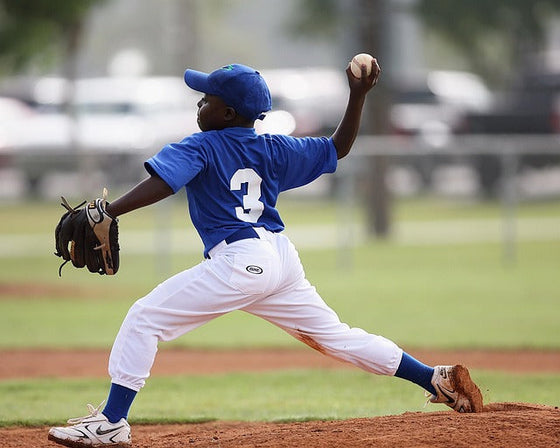by Bobby Woods October 07, 2024

Baseball, often referred to as America’s pastime, is a game that blends strategy, skill, and teamwork. For baseball players, mastering the fundamentals of baseball is critical to building a strong foundation for success. Whether the goal is to have fun, stay active, or pursue a higher level of play, focusing on essential skills like hitting, fielding, throwing, and base running will enhance a player's overall performance. For coaches, instilling these core abilities in a way that is engaging and effective can make all the difference in helping youth players develop confidence and a love for the game.
Learn More
Developing Consistency at the Plate
Hitting is one of the most challenging aspects of baseball & developing solid batting techniques is crucial for young players. The process involves refining mechanics, improving hand-eye coordination & building confidence at the plate
Bobby Woods is a former Chicago Cubs Player & Arizona State University Graduate
A great starting point for coaches is to focus on the proper batting stance and grip. Encourage players to stand with their feet shoulder-width apart, knees slightly bent, and weight balanced. The hands should grip the bat loosely to allow for quick and fluid movement. Coaches can enhance this instruction by utilizing a baseball video that demonstrates ideal techniques, allowing players to visualize and replicate proper form
Next, coaches should emphasize the importance of watching the ball from the pitcher’s hand all the way to the plate. Visual focus and hand-eye coordination are key to making consistent contact. Using drills such as soft toss, tee work, and live batting practice can help players adjust their swings and timing.
Repetition is critical when it comes to hitting. Young players should be encouraged to practice swinging regularly, but coaches must ensure they are not just mindlessly swinging but focusing on mechanics. Regular feedback on each player's swing form can go a long way in building successful hitters.
Mastering Defense
Fielding is another essential skill in baseball that requires sharp reflexes, good footwork, and a clear understanding of how to handle grounders, pop flies, and line drives. Whether playing in the infield or the outfield, every young player needs to develop reliable fielding skills.
Coaches can start by teaching the basic fielding stance: knees bent, weight on the balls of the feet, and glove ready on the ground for ground balls. This stance allows players to react quickly to any ball hit their way. Practicing fielding ground balls from various angles and speeds will help young players improve their ability to read the ball’s trajectory and make accurate plays.
For pop flies, it’s crucial that players learn to track the ball with their eyes and position themselves under it. A good drill for this is the “drop drill,” where coaches toss the ball high in the air and have players react and catch it.
Finally, the transfer from glove to throwing hand must be swift and accurate. Players should work on getting the ball out of their glove and into their hand in one smooth motion. Coaches can simulate game situations in practice to reinforce this essential skill.
Accuracy and Strength
Proper throwing mechanics are critical to success in both defense and offense. Throwing with accuracy and strength is essential for fielders, and teaching the correct form from a young age helps prevent injury and improves long-term performance.
Coaches should teach the proper throwing motion, starting with the grip. Players should hold the ball with their index and middle fingers across the seams, using the thumb underneath for support. This grip allows for greater control and accuracy.
The throwing motion itself involves stepping forward with the opposite foot from the throwing hand, rotating the hips, and following through with the arm. A strong, consistent follow-through helps ensure that throws are on target and reduce stress on the arm. Drills like long toss and accuracy-based games can help young players strengthen their arms while focusing on control.

Speed and Strategy
Base running is often overlooked in youth baseball but is a critical skill that can make a significant impact in games. While speed is a natural advantage, proper base running techniques and decision-making skills can give any player an edge.
Coaches should first focus on teaching players how to run the bases efficiently. This includes rounding the bases with wide turns, keeping the body low when starting a sprint, and maintaining full speed through the base when running to first. Timing is key to getting good jumps on the ball, especially when advancing on wild pitches or passed balls.
Teaching players how to read the defense is also crucial. Knowing when to take a risk on advancing to the next base or staying put can determine the outcome of a play. Coaches can set up drills that simulate game scenarios, such as running from second to home on a single, to reinforce smart base running decisions.
Making Fundamentals Fun for Youth Players
While mastering these skills is important, it’s equally vital to make the learning process enjoyable. Coaches should focus on creating drills and practices that are engaging and competitive without placing too much pressure on young players. Incorporating games, challenges, and rewards can help keep players motivated while reinforcing key fundamentals.
For instance, holding friendly competitions for the most accurate throws or the quickest fielding times can spark enthusiasm among players while giving them a chance to develop their abilities in a supportive environment.
Conclusion
Mastering the fundamentals of baseball—hitting, fielding, throwing, and base running—is essential for any young player aiming to succeed on the field. With guidance from dedicated coaches and a focus on consistent practice, players can build a strong foundation that will benefit them throughout their baseball journey. By making these fundamentals fun and accessible, coaches can ensure that young athletes not only improve their skills but also develop a lifelong love for the game.
Comments will be approved before showing up.

by Bobby Woods November 26, 2025

by Bobby Woods June 10, 2025

by Bobby Woods April 22, 2025
Sign up to get the latest on sales, new releases and more …

Bobby Woods
Author